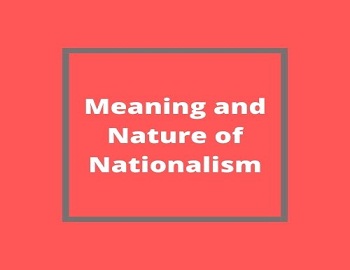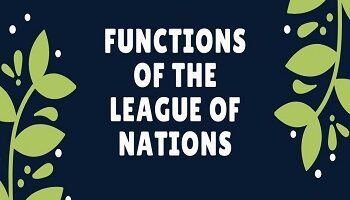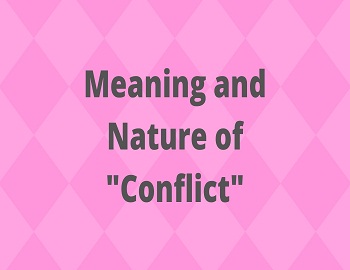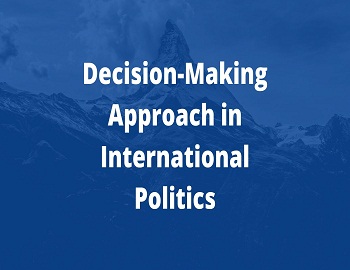Meaning and Nature of Nationalism:
In fact, if nationalism is unmentioned in any serious discussion of international problems, it is because its significance is assumed. As Carlton J. H. Hayes said, “So much is nationalism a commonplace in the modes of thought and action of the civilized populations of the contemporary world that most men take nationalism for granted. Without serious reflection they imagine it to be the most natural thing in the universe and assume that it must always have existed”.
It is very difficult to arrive at a satisfactory definition of nationalism. It is held by many authors of repute that nationalism is not capable of any scientific definition. In fact, to know the real nature and meaning of nationalism we should know different terms like nation, nationality, national self-determination, and patriotism. These are some of the terms related to nationalism.
The term nation is derived from the Latin word natio, which means birth, hence a creature’s entire offspring at one time, hence a clan’s offspring, hence a people’s, hence that people itself. Thus the nation is a group of people with a feeling of solidarity among themselves and a sense of distinctness from others. One of the most satisfactory definitions of ‘nation’ was advanced by Ernest Barker. According to him, “A nation is a body of men, inhabiting a definite territory, who normally are drawn from different races, but possess a common stock of thoughts and feelings, acquired and transmitted during the course of a common history; who on the whole and in the main, though, more in the past than in the present, include in that common stock a common religious belief, who generally and as a rule use a common language as the vehicle of their thoughts and feelings, and who, besides common thoughts and feelings also cherish a common will, and accordingly form, or tend to form a separate state for the expression and realization of that will”.
In his famous lecture, Ernest Renan emphasized the intangible ties, which bind people together into a nation. “What constitutes a nation”, he said, “is not speaking the same tongue or belonging to the same ethnic group, but having accomplished great things in common in the past and the wish to accomplish them in the future”.
The sociologist Louis Wirth defines nationality as “a people who, because of the belief in their common descent and their mission in the world by virtue of their common cultural heritage and historical career aspire to sovereignty over a territory or seek to maintain or enlarge their political or cultural influence in the face of opposition”. Frederick Hertz defines it as “a community formed by the will to be a nation”. It is, “nothing material or mechanical”, observes Arnold J. Toynbee, “but a subjective psychological feeling in a living people”.
National self-determination means “the right of individuals to determine the sovereign state to which they would belong and the form of government under which they would live”. It is the principle by which nationalities justify their efforts to acquire “nationhood in the form of statehood” within states, exalted and strengthened by sovereignty. The right was strongly championed by Woodrow Wilson, and it has inspired many movements, successful and unsuccessful, for national independence.
Patriotism is a familiar concept, commonly defined as love of country. From the historical point of view, it is not necessarily associated with the nation-state. The address of Pericles to the Athenians, of Hannibal to the Carthaginians, of Cicero to the Romans are among the greatest examples of patriotic oratory.
The most revealing clue to its nature is Hayes’s statement that nationalism consists of “a modern emotional fusion and exaggeration of two very old phenomena- nationality and patriotism”. Or, as Hans Kohn puts it, “nationalism is first and foremost a state of mind, an act of consciousness”. In the 20th century, as he observed in subsequent work, “nationalism became, the common form of political life all over the earth, but everywhere nationalism differs in character according to the specific historical conditions and the peculiar social structure of each country” and because of the “stress up to national sovereignty and cultural distinctiveness, has become”a deeply divisive force”. When it “spread to Eastern Europe and later Asia…… nationalism tended toward the closed society, in which the individual counted for less than the strength and authority of the national whole”.
Although he points out that nationalism cannot be defined adequately in simple terms, Professor Louis L. Snyder advances the following statement as “least objectionable”, “………nationalism a product of political, economic, social and intellectual factors at a certain stage in history, is a condition of mind, feeling, or sentiment of a group of people living in a well-defined geographical area speaking a common language, possessing a literature in which the aspirations of the nation have been expressed, attached to common tradition and common customs, venerating its own heroes, and, in some cases, having a common religion”.
Nationalism, says Snyder, is neither wholly logical nor national. Its roots lie in the illogical, irrational, and fantastic world of the unconscious. It is “in part a psychological response to grave threats of insecurity”. Since it is not an innate instinct, but rather a socially conditioned, synthetic sentiment “it can hardly be understood without reference to the findings of psychology and psychoanalysis”.
H .G. Wells wrote that among the Greek city-states patriotism “took an intense and narrow form”. The narrow geographical limits of these Greek states added to love for a man’s native town, his religion and his home, for these were all one. But in the main patriotism in the Greek homes was a personal passion of an inspiring and dangerous intensity. Like rejected love, it was apt to turn into something very much like hatred.
After going through various definitions of nationalism. we can say that nationalism is the strong personal attachment of the individual with the collection of people, places, and patterns of behaviour that make up a nation and its way of life.









Comments (No)